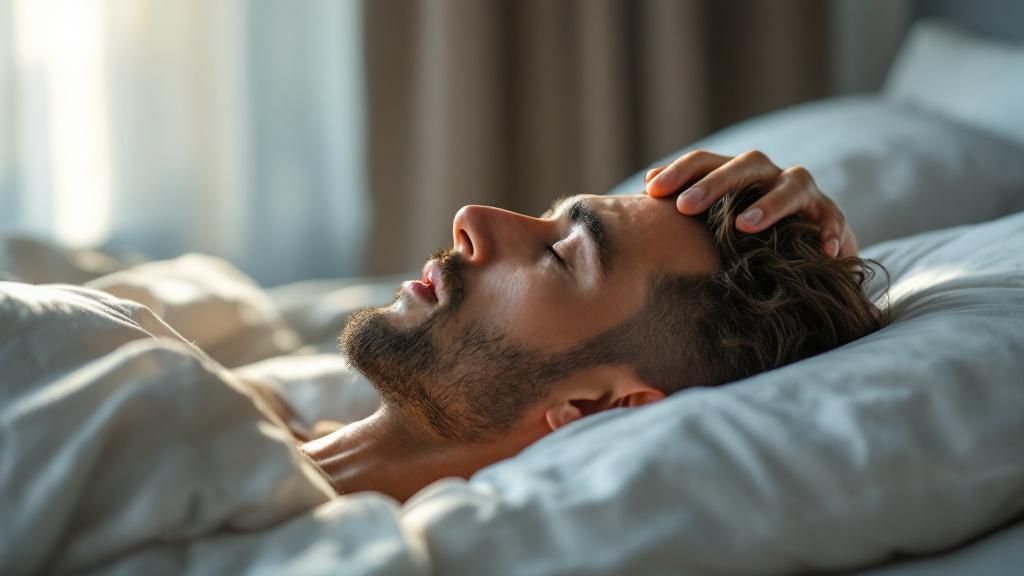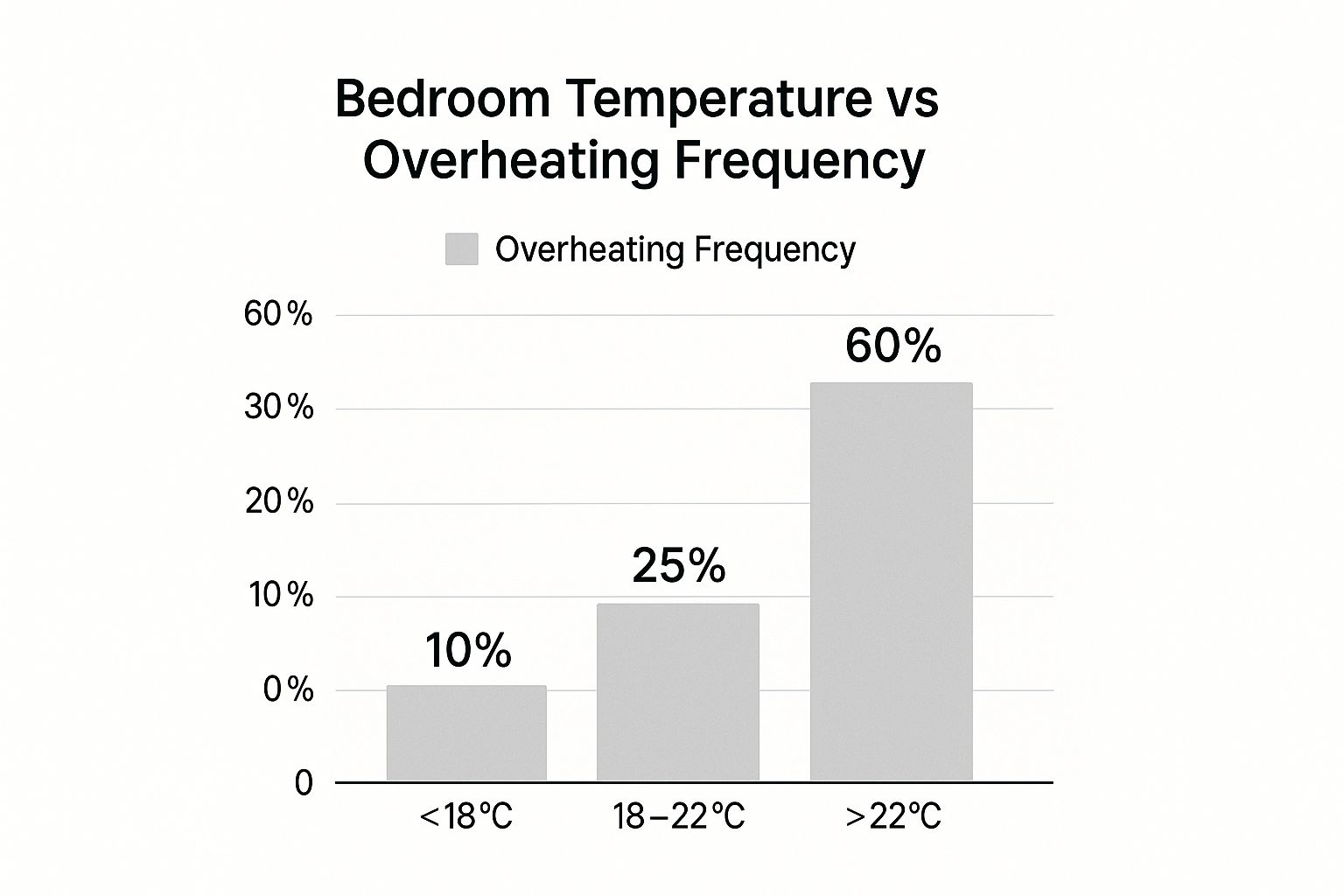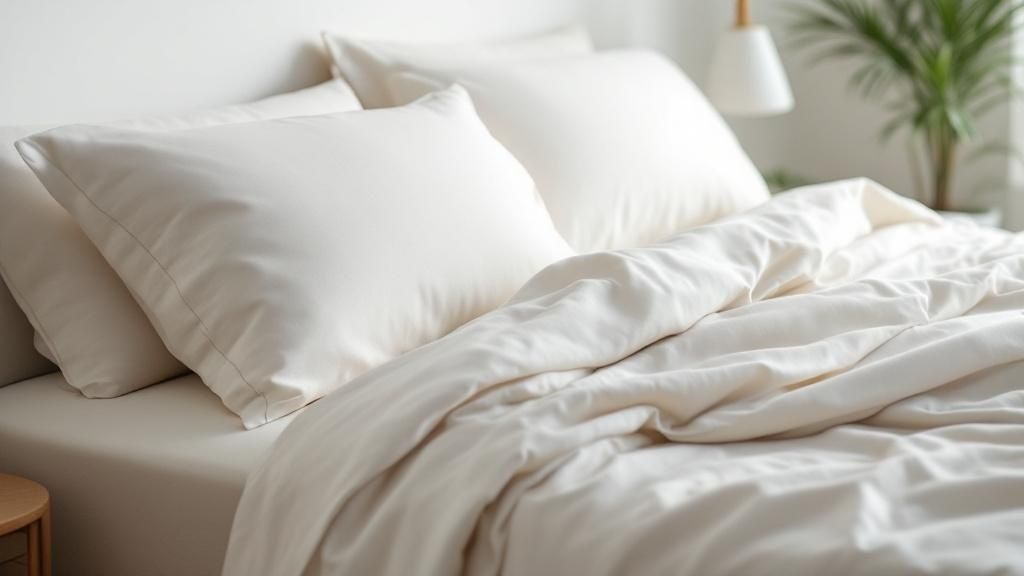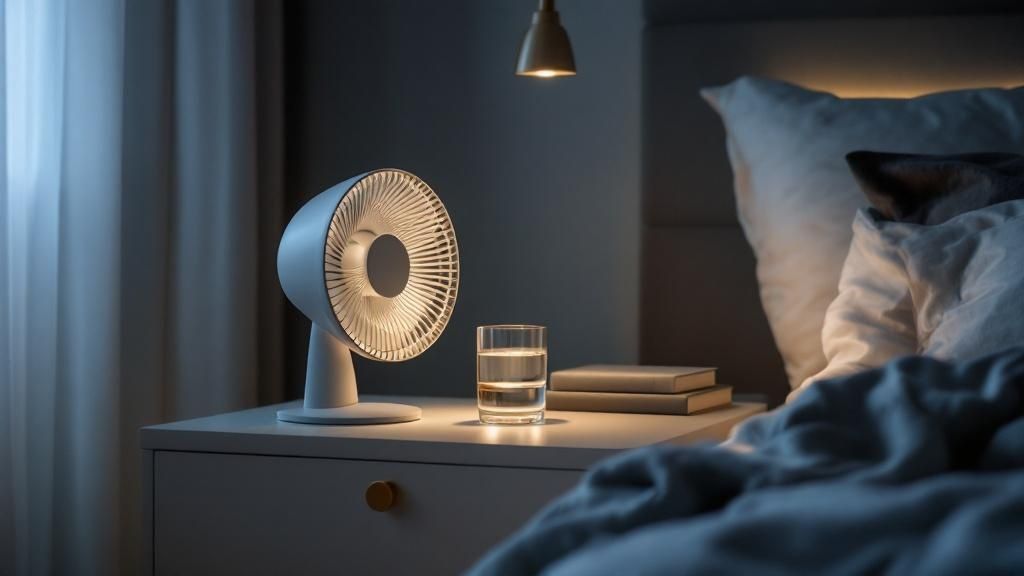If you constantly find yourself kicking off the covers and wondering, "why do I get so hot when I sleep?" you're not alone. The simple answer is that your body and your bedroom are often at odds. For you to fall asleep and stay asleep, your core body temperature actually needs to drop a degree or two. It’s a crucial biological signal for rest, but it's one that's easily thrown off.
Unpacking Why You Overheat in Bed

Waking up in a pool of sweat is more than just uncomfortable; it’s a clear sign your body’s internal thermostat is out of whack. This delicate process, known as thermoregulation, is meant to manage your internal heat to pave the way for deep, restorative sleep. When it's all working smoothly, you drift off without a second thought.
But a whole host of things can disrupt this system, leaving you feeling overheated and restless. Some of the culprits are internal—think hormonal shifts or your own metabolism. Others are external, like a heat-trapping mattress or even the broader climate we live in.
Your Body’s Internal Thermostat
Your internal clock, or circadian rhythm, is the master conductor of your body's daily functions. A critical part of its performance is dropping your core temperature in the evening to signal that it's time to wind down. But a few things can mess with that signal:
- Hormonal Swings: Fluctuating hormones, particularly during menopause, are famous for causing sudden waves of intense heat. These are the hot flashes and night sweats that so many people experience.
- Metabolism: Your body creates heat just by digesting food. If you have a large, heavy meal too close to bedtime, your metabolic furnace kicks into high gear right when it should be powering down, raising your temperature.
- Stress and Anxiety: When you’re stressed, your body pumps out hormones like cortisol. This can ramp up your heart rate and body temperature, making it that much harder to cool down and relax into sleep.
The Heat from Outside
It's not all about what’s happening inside you, though. Your immediate environment plays a huge part in how hot you feel at night.
Rising global temperatures are becoming a serious sleep disruptor. One eye-opening analysis revealed that 2.4 billion people are now dealing with at least two extra weeks of nighttime temperatures above 77°F (25°C) every year.
What's more, nights that climb above 86°F (30°C) can slash your sleep time by about 14 minutes per night. That might not sound like much, but it adds up to nearly 44 hours of lost sleep over a year. You can discover more insights about these climate findings and how they're impacting our rest.
How Your Bedroom Environment Sabotages Sleep
Ever wonder, "why do I overheat at night?" The answer often isn't just about your body—it's woven into the very fabric of your bedroom. Your sleep space might feel perfectly fine when you first get into bed, but it can quickly become a heat trap that messes with your body's natural need to cool down for deep sleep.
Your bedroom's temperature is a huge piece of the puzzle. If you're constantly waking up sweaty, a struggling or inefficient air conditioner could be the culprit. It might be worth looking into professional AC repair services to make sure your system is actually cooling your room effectively. After all, experts agree that the ideal temperature for sleep is somewhere between 60 and 67°F (15-19°C). That cool air is a powerful signal to your brain that it's time to rest.
Beyond the Thermostat
But even with the AC cranked up, other things in your room can still work against you. Think about your mattress. Those popular dense memory foam mattresses? They're notorious for trapping body heat and reflecting it right back at you. The same goes for synthetic bedding like polyester, which essentially acts like a plastic wrap, holding in heat and moisture.
This is a bigger issue than ever before, with rising global temperatures making our nights warmer. A startling analysis revealed that nighttime heatwaves are actually becoming more frequent and intense than daytime ones.
The connection between room temperature and waking up hot is undeniable, as this chart shows.

As you can see, once a room gets warmer than 22°C (about 72°F), the likelihood of overheating skyrockets. It's a clear sign that turning your bedroom into a cool, breathable sanctuary is a must.
Here's a table breaking down some common culprits and how you can fix them.
Cooling Down Your Sleep Environment
| Factor | Problem | Actionable Solution |
|---|---|---|
| Bedding Material | Synthetic fabrics like polyester trap heat and moisture, preventing your body from cooling down. | Switch to natural, breathable fibers like cotton, bamboo, or linen. They wick moisture and allow air to circulate. |
| Mattress Type | Dense memory foam is known for holding onto body heat, creating a personal furnace effect. | Consider a hybrid or innerspring mattress for better airflow, or add a cooling mattress topper made from gel-infused foam or latex. |
| Humidity | High humidity makes the air feel much warmer than the actual temperature and prevents sweat from evaporating effectively. | Use a dehumidifier to bring the room's humidity down to a comfortable 40-60% range. |
| Hidden Heat Sources | Electronics (even on standby) and residual heat from daytime sun can warm up a room overnight. | Unplug unnecessary electronics before bed and use blackout curtains to block out both light and heat from outside. |
Taking control of these environmental factors can make a world of difference.
Here are a few quick tips to get started:
- Pick Breathable Bedding: Look for natural fibers. Linen, cotton, and bamboo are fantastic because they wick away moisture and let your skin breathe.
- Tackle the Humidity: If your room feels sticky, it's probably too humid. A dehumidifier can dramatically improve how comfortable the air feels.
- Cut Off Hidden Heat: Electronics generate heat even when they're not in use. Unplug them. Blackout curtains are also great for blocking the residual heat absorbed by your windows during the day.
Creating the right environment is one of the most powerful steps you can take. For a complete guide, check out these tips on https://bamtekhome.com/blogs/how-to-keep-bedroom-cool-at-night.
How Your Daily Routine Might Be Causing Your Night Sweats

If you're constantly asking yourself, "Why do I overheat at night?" the answer might be hiding in plain sight—right in your daily routine. The choices you make long before you even think about sleep can set your internal thermostat to high, just when it should be powering down.
Many of our everyday activities, from what we eat to how we move, have a thermic effect that can stick around for hours. Take your evening meal, for example. A big, heavy dinner or something extra spicy kicks your digestive system into overdrive, generating a surprising amount of metabolic heat. This digestive process often peaks right as you’re trying to fall asleep, making it tough for your core temperature to drop.
Fine-Tuning Your Evening for a Cooler Sleep
When it comes to staying cool at night, timing is everything. It's not just what you do, but when you do it.
Sipping on caffeine or alcohol too close to bedtime can seriously mess with your body's temperature controls. While a glass of wine might make you feel sleepy at first, your body temperature can spike as it's metabolized, leading to fragmented sleep and those dreaded night sweats.
The same principle applies to exercise. An intense workout is fantastic for your health, but a high-energy session less than three hours before bed can leave your core temperature elevated for hours. If you're already a hot sleeper, this is a recipe for a restless night.
A few simple swaps can make a world of difference. Try having your main meal earlier and sticking to a light snack if you get hungry later. Instead of a late-night run, consider some gentle stretching or yoga to help your body wind down without turning up the heat.
Even your bathing habits play a role. The impact of post-workout shower temperature on sleep shows how a small change here can set the stage for a much cooler night.
Here are a few practical adjustments you can make to your routine:
- Rethink Dinner Time: Try to finish your last big meal at least three hours before you plan to sleep. This gives your body plenty of time to digest and start its natural cool-down process.
- Time Your Workouts Wisely: Keep your more strenuous workouts for earlier in the day. If evenings are your only option, stick to lower-impact activities like a calm walk or some restorative yoga.
- Watch Your Evening Drinks: Cut off caffeine by 2 p.m. and scale back on alcohol in the final hours before bed. Reaching for a cool glass of water is a much better bet.
By syncing your daily habits with your body's natural rhythm, you're not just hoping for better sleep—you're actively creating the conditions for a cool, comfortable, and truly restorative night.
When Night Sweats Might Point to Something More
So, you’ve tried everything. Your bedroom is a cool sanctuary, you've tweaked your daily routines, but you’re still waking up drenched. If you're constantly asking, "why am I still so hot at night?", it might be time to look a little deeper. Most of the time, the cause is simple and lifestyle-related, but persistent night sweats can occasionally be your body's way of sending up a flare.
This isn't a reason to panic, but it is a reason to be aware. For many, disruptive overheating is tied to hormonal shifts. Think perimenopause and menopause, which are notorious for causing those infamous hot flashes that don't just stick to daytime hours. An overactive thyroid can also kick your metabolism into overdrive, causing you to sweat more around the clock.
Looking at Potential Underlying Causes
It's also worth looking at your medicine cabinet. Certain common medications, like some antidepressants or drugs for diabetes, can mess with your body's internal thermostat and list night sweats as a known side effect. Even something like anxiety can be a culprit; it can trigger your "fight or flight" response while you sleep, spiking your heart rate and making you overheat.
A Quick Gut Check: If you're experiencing drenching night sweats on a regular basis, especially if they come with other symptoms like a fever or unexplained weight loss, that’s your cue to talk to a doctor.
Sleep disorders can be a factor, too. Sleep apnea, in particular, puts a lot of stress on your body. Those repeated pauses in breathing can trigger a sweat response as your body struggles.
While you figure things out, you can at least make sure your bedding isn't making things worse. For some immediate relief, take a look at our guide on cooling sheets for night sweats.
It’s also important to acknowledge that our environment is changing. Rising global temperatures are leading to more "tropical nights"—nights where the air just doesn't cool down enough for our bodies to shed the heat from the day. This isn't just uncomfortable; it's a real physiological stressor.
A 2023 study even found that all-cause mortality increased by a startling 9-10% after these intensely warm nights. It’s a serious issue, and you can learn more about these important climate findings and what they mean for our health.
Simple Ways to Get a Cooler Night's Sleep
Now that we've covered why you might be overheating at night, let's get into some practical solutions. The good news is you can start making changes tonight with some simple, effective tactics that work with your body's natural cooling process, not against it.
One of the easiest things to try is adjusting your pre-bed routine. Taking a lukewarm shower an hour or two before you plan to sleep can work wonders. The slightly warm water brings blood to the surface of your skin, and when you get out, the rapid cool-down sends a strong signal to your brain that it’s time to rest.
Rethink Your Pajamas and Sheets
What you wear to bed and what you sleep on can make or break your night. If you’re wearing tight, synthetic fabrics like polyester, you’re basically wrapping yourself in plastic, trapping heat and moisture right against your skin.
Instead, go for loose-fitting sleepwear made from natural, breathable fibers. Think lightweight cotton, airy linen, or moisture-wicking bamboo. These materials let air circulate and pull sweat away from your body, which is key to staying dry and comfortable all night.
The same logic applies to your bedding. If you want to dive deeper into how your sheets affect your temperature, our guide on bamboo sheets as a cool choice for hot sleepers is a great resource.
Pro Tip: The "Egyptian Method"
On those really sweltering nights, you might need to pull out an old-school trick. Lightly dampen a sheet or a large towel with cool water, wring it out so it's not dripping wet, and use that as your blanket. As the water evaporates throughout the night, it actively cools you down.
Get Smart About Airflow
You don't always have to blast the AC to feel a difference. Strategic airflow can be surprisingly powerful.
Positioning a fan to blow out an open window can create a fantastic cross-breeze. This simple setup pulls cooler night air into the room while pushing the hot, stuffy air out.
If that's not an option, try this fan hack for a DIY air conditioner:
- Grab a shallow bowl and fill it with ice cubes or a couple of frozen water bottles.
- Place the bowl right in front of your fan.
- The fan will blow over the ice, circulating refreshingly cool, misty air around your room.
It’s these small, intentional adjustments that can turn a stuffy bedroom into a cool sanctuary for sleep.
Common Questions About Overheating at Night

Even after you've made a few adjustments to your sleep setup, it's natural to have lingering questions about why you're still feeling so hot at night. Let's tackle some of the most common ones I hear.
Is It Normal to Overheat at Night but Be Cold During the Day?
Believe it or not, yes. This is surprisingly common and it often means your body's internal thermostat is a bit out of whack. Things like hormonal fluctuations, especially during a menstrual cycle or perimenopause, can really throw your temperature regulation for a loop.
Your body is actually programmed by its circadian rhythm to drop its core temperature to prepare for sleep. If that delicate process gets disrupted, you can end up with those frustratingly dramatic temperature swings from day to night.
Can Anxiety Cause Me to Overheat Only at Night?
Absolutely. Anxiety is a powerful trigger for your body's "fight or flight" response. This floods your system with stress hormones that kick your heart rate and body temperature into high gear.
During a hectic day, you might not even notice these anxious feelings because you're distracted. But when the world goes quiet at night, those thoughts can feel much louder, setting off a very real, physical reaction like overheating or night sweats.
Key Takeaway: A calm mind really is a key ingredient for a cool body. Building a simple pre-sleep routine with activities like meditation, journaling, or a few minutes of deep breathing can help settle your mind and dial down that physical stress response before it has a chance to heat you up.
When Should I See a Doctor About Overheating at Night?
Occasional overheating usually isn't a major cause for concern, but there are definitely times when it's best to check in with a doctor.
You should consider making an appointment if your night sweats:
- Happen regularly and consistently ruin your sleep.
- Are so intense that you're soaking through your pajamas or sheets.
- Come with other concerning symptoms, like unexplained weight loss, a fever that won't go away, or crushing fatigue during the day.
A healthcare professional can dig deeper to see if there's an underlying issue. Getting a proper diagnosis is the only way to create a treatment plan that will get you back to sleeping soundly through the night.
At Bamtek, we’re firm believers that the right bedding can be a game-changer for cool, comfortable sleep. Our 100% organic bamboo sheets are designed to be naturally thermoregulating and moisture-wicking, helping solve the frustrating "why do I overheat at night" puzzle for good. See for yourself at https://bamtekhome.com.










